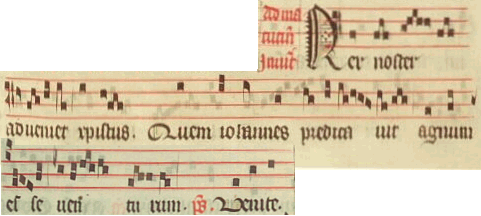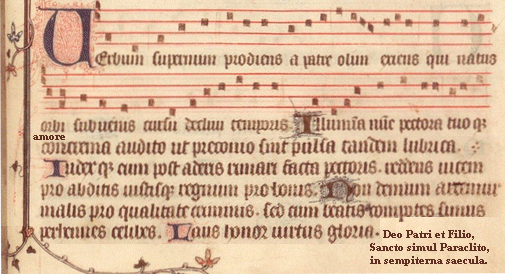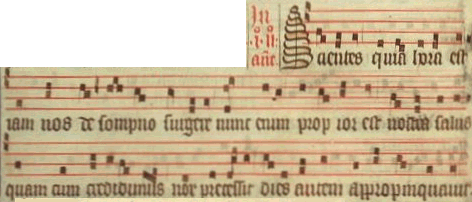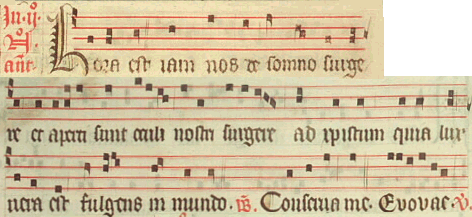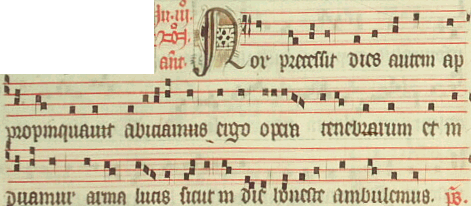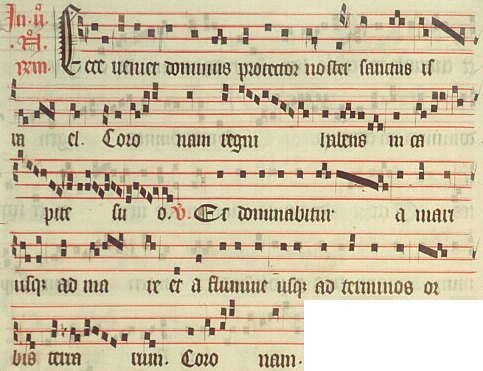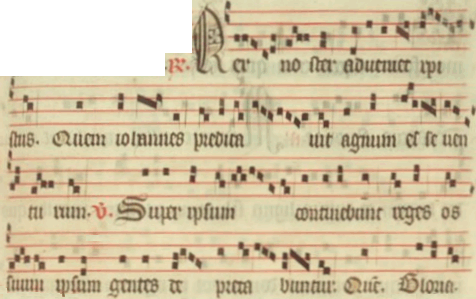Even Years: Eusebius of Caesarea, Commentary on Isaiah
J. Ziegler, Eusebius Werke, Band 9: Der Jesajakommentar. Die griechischen christlichen Schriftsteller. Berlin: Akademie Verlag, 1975: 3-411 (variant: PG 24, 366-7)
| φωνὴ
βοῶντος ἐν τῇ ἐρήμῳ
Ἑτοιμάσατε
τὴν ὁδὸν κυρίου,
τοῦτ' ἔστι τὸ
εὐαγγελικὸν
κήρυγμα ἢ ἡ
καινὴ παράκλησις
αὕτη ἡ πᾶσιν
ἀνθρώποις
γνωσθήσεσθαι
τὸ σωτήριον
τοῦ θεοῦ
ἐπιζητοῦσα. σαφῶς
παρίστη μὴ ἐν
τῇ Ἰερουσαλὴμ
γενήσεσθαι τὰ
θεσπιζόμενα,
ἀλλ' ἐπὶ τῆς
ἐρήμου, λέγω δὲ
τὸ ὀφθήσεσθαι
τὴν δόξαν
κυρίου καὶ τὸ
πάσῃ σαρκὶ
γνωσθήσεσθαι
τὸ σωτήριον
τοῦ θεοῦ.
| The voice of one crying in the wilderness, prepare the way of the Lord, make straight the paths of our God. This makes clear that the events spoken of in the prophecy are to take place not in Jerusalem, but in the wilderness. By this is meant that the glory of the Lord will appear, and the salvation of God will be made known to all flesh.
| | καὶ
ταῦτα μὲν
ἐπληροῦτο
πρὸς ἱστορίαν
καὶ λέξιν ἐπὶ
τοῦ βαπτιστοῦ
Ἰωάννου
κηρύσσοντος
τὴν σωτήριον
θεοφάνειαν ἐν
τῇ ἐρήμῳ τοῦ
Ἰορδάνου, ἐν ᾗ
καὶ τὸ
σωτήριον ὤφθη
τοῦ θεοῦ. αὐτὸς
ὁ Χριστός, ἥ τε
δόξα αὐτοῦ
τοῖς πᾶσιν
ἐγνώσθη, ὅτε
βαπτισθέντος
αὐτοῦ
"ἠνεῴχθησαν οἱ
οὐρανοί", καὶ
"τὸ πνεῦμα τὸ
ἅγιον ἐν εἴδει
περιστερᾶς καταβὰν"
"ἔμεινεν ἐπ'
αὐτόν", "φωνή" τε
ἠνέχθη
πατρικὴ τῷ υἱῷ
μαρτυροῦσα· "οὗτός
ἐστιν ὁ υἱός
μου ὁ ἀγαπητός,
αὐτοῦ ἀκούετε"
| This prophecy was fulfilled historically and literally, when John the Baptist preached the saving advent of God, in the wilderness by the Jordan, where the salvation of God was in fact seen. For Christ and his glory became known to all when, after he had been baptized, the heavens were opened, and the Holy Spirit came down under the appearance of a dove, and rested upon him. Then was the Father's voice heard in testimony to the Son: This is my Son, my Beloved; listen to him!
| | ὡς
γὰρ μέλλοντος
ἐπιδημεῖν τῇ
ἐρήμῳ καὶ τῇ
ἐξ αἰῶνος
ἀβάτῳ τοῦ θεοῦ
ταῦτα ἐλέγετο. ἦν
δὲ τὰ ἔθνη
πάντα ἔρημα
θεοῦ γνώσεως
καὶ ἄβατα πᾶσι
τοῖς τοῦ θεοῦ
δικαίοις τε
καὶ προφήταις
ἀνδράσι. διόπερ
ἡ φωνὴ
παρακελεύεται
ὁδὸν
εὐτρεπίζειν τῷ
τοῦ θεοῦ λόγῳ
καὶ τὴν ἄβατον
καὶ τραχεῖαν
ὁμαλὴν ποιεῖν,
ἵνα ἐπιβῇ
ἐπιδημήσας ὁ
θεὸς ἡμῶν μετὰ
προσθήκης τῆς
ἡμῶν· εὐθείας γάρ φησι ποιεῖτε τὰς τρίβους τοῦ
θεοῦ ἡμῶν·
| These things were said because God was about to come to the wilderness, which had been impenetrable and inaccessible for a whole age. For all the nations were empty of the knowledge of God: access to them had been prohibited to all the men of God and the prophets. That was why that voice ordered a way to be prepared for the Word of God, and the pathless and rugged lands levelled, so that at his coming, our God might find the road clear for his advance. For he adds immediately: Prepare the way of the Lord.
| | Σφόδρα
καὶ ταῦτα τῇ τῶν
προλεχθέντων ἕπεται
διανοίᾳ εὐκαίρως
καὶ τῶν εὐαγγελιστῶν
μνήμην ποιούμενα
καὶ παρουσίαν θεοῦ
ἀνθρώποις εὐαγγελιζόμενα,
μετὰ τὰ περὶ "τῆς
ἐν τῇ ἐρήμῳ βοώσης
φωνῆς". ἵπετο γὰρ
τῇ περὶ Ἰωάννου
τοῦ βαπτιστοῦ προφητείᾳ
ὁ περὶ τῶν εὐαγγελιστῶν
τοῦ σωτῆρος λόγος,
ἥ τε τῆς θεοφανείας
αὐτοῦ δήλωσις
|
These words fit in very well with the meaning of our first quotation. They make an appropriate reference to the preachers of the Gospel, and announce the coming of God among men, after we have heard of the voice crying in the wilderness. It is fitting that after the prophecy about John the Baptist, the preachers of the Savior be mentioned—an indication of his divine appearance.
| | ἐπ' ὄρος
ὑψηλὸν ἀνάβηθι
σεαυτῇ ἡ εὐαγγελιζομένη
Σιών, καὶ ἔπαρον
ὑψηλῶς τὴν φωνήν
σου ἡ εὐαγγελιζομένη
Ἰερουσαλήμ, ἔπαρον,
μὴ φοβοῦ. καὶ διὰ
τούτων δὲ θέα ὡς
ἔμψυχον καὶ ζῶσαν
τὴν Σιὼν καὶ τὴν
Ἰερουσαλὴμ οἶδεν
ὁ λόγος· ἀναβῆναι
γοῦν αὐτὴν ἑαυτῆς
ἐπὶ ὑψηλὸν ὄρος
καὶ τὴν φωνὴν αὐτῆς
ὑψῶσαι ἐν τῷ εὐαγγελίζεσθαι
τὴν τοῦ θεοῦ παρουσίαν
παρεκελεύετο.
| Get you up to a high mountain, O herald of good tidings to Sion, lift up your voice with strength, O herald of good tidings to Jerusalem. Lift up; do not fear. In expressions see how the Word recognizes Zion as animate and living. For it commands her to go up a high mountain and raise her voice in announcing the good news of God's presence.
| | τίς οὖν
ἐστιν αὕτη Σιὼν
ἐπ' ὄρος ὑψηλὸν
ἕτερον παρ' αὐτὴν
ἀνιοῦσα; καὶ αὕτη
γὰρ ὄρος ἦν, ὡς δηλοῖ
ἡ φάσκουσα γραφή·
"ὄρος Σιὼν τοῦτο,
ὃ κατεσκήνωσας
ἐν αὐτῷ", καὶ ὁ Ἀπόστολος·
"προσεληλύθατε Σιὼν ὄρει", ἢ πάντως που ἡ διὰ τῶν ἔμπροσθεν "καρδία Ἰερουσαλὴμ" ὠνομασμένη. καὶ μή ποτε νῦν ὁχορὸς ὁ ἀποστολικὸς ὁ ἐκ τοῦ προτέρου λαοῦ ἐκ περιτομῆς ἐξειλεγμένος τοῦτον σημαίνεταιτὸν τρόπον;
αὕτη γάρ ἐστι Σιὼν καὶ Ἰερουσαλὴμ ἡ "τὸ σωτήριον τοῦ θεοῦ" παραδεδεγμένη, ἐπηρτημένη τις οὖσα καὶ αὕτη καὶ τῷ ὄρει τοῦ θεοῦ τῷ μονογενεῖ αὐτοῦ λόγῳ παρεικασμένη, ᾗ προστάττει εὐαγγελίζεσθαι ἀνελθούσῃ ἐπ
ὄρος ὑψηλὸν τὸν σωτήριον λόγον. καὶ δὴ ὁ εὐαγγελικὸς
χορὸς καὶ αἱ ἅγιαι
καὶ ἐπηρτημέναι
τῷ τῆς ἀρετῆς φρονήματι
ψυχαὶ Σιὼν καὶ Ἰερουσαλὴμ
ὀνομαζόμεναι ἐπὶ
τὸ ὄρος τὸ ὑψηλὸν
τῆς θεότητος τοῦ
μονογενοῦς τοῦ
θεοῦ κελεύονται
ἀνιέναι κἀκεῖθεν
ἄνωθεν ἀφ' ὑψηλοῦ
εὐαγγελίζεσθαι
καὶ κηρύττειν ἅπασιν
ἀνθρώποις τοῦ Χριστοῦ
τοῦ θεοῦ τὴν ἐπὶ
γῆς παρουσίαν.
| Who then is this Sion, except she who earlier was called Jerusalem? For she too is a mountain, according to that passage of Scripture, The mountain of Sion, where you made your dwelling, and the Apostle says, You have come to Mount Sion—previously called "the heart of Jerusalem". Does this perhaps refer to the band of Apostles, chosen from among the former people of the circumcision?
This Sion and Jerusalem is she who receives the salvation of God. She herself is placed on high on the mountain of God, that is on his Only-begotten Word. To her he gives the command to get up on a high mountain, and preach the word of salvation. But who preaches the good tidings, if not the choir of those who make the Gospel known, and those who are called the souls of Zion and Jerusalem, who are raised up by their virutous minds, and are commanded to go up to the high mountain of the divinity of the only-begotten Son of God, and from that height to announce the good news, and preach to all men the presence of the Christ of God?
|
|
Odd Years: Ambrose of Milan, Commentary on Psalm 118 (Sermón 19, 30-32: CSEL 62, 437-439)
| Cum ergo tanta ecclesiae gratia, tanta nos praemia deuotionis inuitent, praeueniamus orientem
solem, occurramus ad eius ortus, antequam dicat: ecce adsum. uult se
praeueniri sol iustitiae et ut praeueniatur expectat.
| How abundant is the grace of the Church, how great the rewards of a living faith! Since these invite us, let us forestall the rising sun to greet Christ, the Sun of justice, before he can say: See, here I am. He both wants and expects us to be there before him.
| | audi quemadmodum
expectet et cupiat praeueniri: dicit angelo Pergami ecclesiae: age
paenitentiam, ceterum uenio tibi. dicit angelo Laodiciae: aemulare ergo et
paenitentiam age. ecce sto ad ianuam et pulso, et si quis audierit uocem meam
et aperuerit ianuam, intrabo ad eum. poterit intrare; denique nec resurgentem
eum cum corpore ulla clausarum ualuarum repagula retinere potuerunt, subito se
apostolicis penetralibus inprouisus infudit. sed studia deuotionis tuae
desiderat experiri, apostolos iam probatos habebat. aut forte in persecutione
praeuenit; ubi tranquillitas est, praeueniri cupit.
| You can hear Christ's desire and expectation expressed in his words to the angel of the church of Pergamum: Repent, or I will soon come to you, and to the angel of Laodicea: Be zealous and repent. See, I stand at the door and knock; if anyone hears my voice and opens the door, I will come in to him. He will have no difficulty in entering; no barrier of closed doors was able to shut out his body after he had risen from the dead. Suddenly, unexpectedly, he was present in the room where the Apostles were gathered. He had already tested the Apostles; he wants now to test your zeal and devotion. In time of persecution he may take the initiative; where all is tranquil, he wants you to be ready and waiting for him.
| | praeueni certe hunc
quem uides solem, surge qui dormis et exsurge a mortuis, ut inlucescat tibi
Christus. si hunc solem praeueneris, antequam iste surgat, accipies Christum
inluminantem. ipse prius in tui cordis inlucescet arcano, ipse tibi dicenti: de
nocte uigilat ad te spiritus meus matutinum lumen temporibus faciet splendere
nocturnis, si mediteris uerba dei. dum enim meditaris, lux est et uidens lucem
non temporis, sed gratiae dices: quia lux praecepta tua. cum autem te
meditantem uerba diuina dies inuenerit et tam gratum opus orandi atque
psallendi delectauerit tuam mentem, iterum dices ad dominum Iesum: exitus
matutinos et uespere delectabis.
| Be on the watch before the sun is visible in the sky. Awake, sleeper, and rise from the dead, so that Christ may shine on you. If you are vigilant you will receive Christ's light before sunrise. Before daybreak he will shine into the depth of your heart. Even as you say: My spirit watches for you in the night, Christ will make the light of morning illuminate your nocturnal meditation on the word of God. As you meditate, light will dawn. Seeing the light —not of the day but of grace— you will exclaim: Your commandments are my light! When day finds you meditating on God's word and the pleasant task of prayer and psalmody delights your mind, you will once more say to the Lord Jesus: You fill both morning and evening with joy.
| | An uero Moyse magistro
usus populus Iudaeorum cotidie in senioribus suis, qui ad hoc munus electi
sunt, noctibus ac diebus sine ulla cessatione recenset scripturas diuinas et,
si quid aliud seniorem interrogaueris, nescit nisi scripturae diuinae seriem resultare,
uacat illic sermo de saeculo, sola illic scriptura contexitur, singulorum sibi
per uices ora succedunt, ne quando sacer ille sonus mandatorum caelestium
ferietur: et tu, christiane, dormis, cui magister est Christus, et non uereris,
ne de te dicatur: populus iste nec labiis me honorat, Iudaeus uel labiis, tu
uero nec labiis? si illius qui uel labiis honorat cor longe est a deo, quomodo
potest cor tuum prope esse, qui etiam labiis non honoras? quamdiu somnus,
quamdiu te saecularia tenent, quamdiu sollicitudines istius uitae, quamdiu
terrena!
| In obedience to their master Moses, the Jewish people have the sacred Scripture recited continuously, night and day, by elders appointed for this purpose. Ask an elder about anything else and you will find this is his only skill: to recite the Scriptures in sequence. With the Jewish elders there is no worldly conversation: Scripture alone is their occupation; voice follows voice in turn so that the holy sound of God's commandments knows no holiday. How then can you, a Christian, with Christ as your master, take your sleep without fear of having it said to you: This people does not even honour me with its lips. The Jewish people do so, but you do not. What a length of time you are sunk in sleep, in secular affairs, in the cares of this life, in things of earth!
| | Diuide saltem deo et
saeculo tempora tua; uel, quando non potes agere in publico, quae sunt istius
mundi, et tenebrae prohibent noctis, deo uacato, indulge orationibus et, ne
obdormiscas, psallito, somnum tuum bona fraude fraudato. mane festina ad
ecclesiam, defer primitias pii uoti; et postea, si uocat saecularis necessitas,
non excluderis dicere: praeuenerunt oculi mei mane meditari uerba tua; securus procedes ad tuos actus.
| At least divide your time between God and the world. When you cannot carry out the business of this world in public and are hindered from pursuing it by the darkness of night, give time to God, give yourself to prayer. To keep yourself from dropping off to sleep, recite a psalm, cheat sleep with holy guile. In the morning hurry off to church, offer the first fruits of your prayers, and after that, if the world and its needs call you, you will be able to say: My eyes are watchful in the morning, to meditate on your words. Then you can attend to your affairs with a serene mind.
| | quam iucundum inchoare ab hymnis et canticis, a beatitudinibus quas in euangelio legis, quam prosperum, ut te Christi sermo benedicat et, dum recantas domini benedictiones, studium alicuius uirtutis adsumas, ut etiam in te benedictionis diuinae meritum recognoscas!
| [How pleasant it is to begin with hymns and canticles and the beatitudes which you read in the Gospel. How advantageous it is for Christ's word to bless you and, while you chant the blessings he made, you strive to acquire some virtue, that you may also witness the merit of God's blessing.]
|
|
